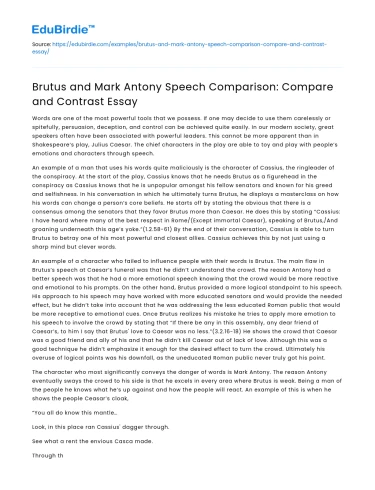Words are one of the most powerful tools that we possess. If one may decide to use them carelessly or spitefully, persuasion, deception, and control can be achieved quite easily. In our modern society, great speakers often have been associated with powerful leaders. This cannot be more apparent than in Shakespeare’s play, Julius Caesar. The chief characters in the play are able to toy and play with people’s emotions and characters through speech.
An example of a man that uses his words quite maliciously is the character of Cassius, the ringleader of the conspiracy. At the start of the play, Cassius knows that he needs Brutus as a figurehead in the conspiracy as Cassius knows that he is unpopular amongst his fellow senators and known for his greed and selfishness. In his conversation in which he ultimately turns Brutus, he displays a masterclass on how his words can change a person’s core beliefs. He starts off by stating the obvious that there is a consensus among the senators that they favor Brutus more than Caesar. He does this by stating “Cassius: I have heard where many of the best respect in Rome/(Except immortal Caesar), speaking of Brutus,/And groaning underneath this age’s yoke.”(1.2.58-61) By the end of their conversation, Cassius is able to turn Brutus to betray one of his most powerful and closest allies. Cassius achieves this by not just using a sharp mind but clever words.
Save your time!
We can take care of your essay
- Proper editing and formatting
- Free revision, title page, and bibliography
- Flexible prices and money-back guarantee
An example of a character who failed to influence people with their words is Brutus. The main flaw in Brutus’s speech at Caesar’s funeral was that he didn’t understand the crowd. The reason Antony had a better speech was that he had a more emotional speech knowing that the crowd would be more reactive and emotional to his prompts. On the other hand, Brutus provided a more logical standpoint to his speech. His approach to his speech may have worked with more educated senators and would provide the needed effect, but he didn’t take into account that he was addressing the less educated Roman public that would be more receptive to emotional cues. Once Brutus realizes his mistake he tries to apply more emotion to his speech to involve the crowd by stating that “If there be any in this assembly, any dear friend of Caesar’s, to him I say that Brutus' love to Caesar was no less.”(3.2.16-18) He shows the crowd that Caesar was a good friend and ally of his and that he didn’t kill Caesar out of lack of love. Although this was a good technique he didn’t emphasize it enough for the desired effect to turn the crowd. Ultimately his overuse of logical points was his downfall, as the uneducated Roman public never truly got his point.
The character who most significantly conveys the danger of words is Mark Antony. The reason Antony eventually sways the crowd to his side is that he excels in every area where Brutus is weak. Being a man of the people he knows what he’s up against and how the people will react. An example of this is when he shows the people Ceasar’s cloak,
“You all do know this mantle…
Look, in this place ran Cassius' dagger through.
See what a rent the envious Casca made.
Through this the well-belovèd Brutus stabbed.
And as he plucked his cursèd steel away,
Mark how the blood of Caesar followed it,
As rushing out of doors, to be resolved
If Brutus so unkindly knocked, or no.”(3.2.161.165-171)
Antony shapes his argument to be filled with emotion to make the people feel pity and sadness towards Caesar and disgust towards the conspirators. Another advantage Antony had was to have Brutus go before him. Now he knows how the audience reacted to Brutus and can easily disprove what Brutus has said before. He does this by giving the audience multiple examples of how Caesar was compassionate toward the people and was not ambitious. “I thrice presented to (Caesar) a kingly crown, Which he did thrice refuse” (3.2.88-89) and “When the poor have cried, Caesar hath wept;/ Ambition should be made of sterner stuff.” (3.2.83-85) What he wants to show is that if Caesar had been ambitious and all the negative things that Brutus had tied to Caesar were true, he would have accepted the crown and would not have cared for the wellbeing of his people. With these statements, Antony begins to gain the approval of the common people eventually turning them against the conspiracy.
In Julius Caesar, Shakespeare proves vividly how words are more powerful than any weapon a man could possess. He displays this by crafting three characters that perfectly exemplify how dangerous words can be. Brutus, Cassius, and Antony explain how words have a lasting effect that no conflict or violence could ever create. This play exhibits that these types of wounds are reversed from the ones that we are used to, they hurt us from the inside out. Wars could end, and wounds can heal, but it is shown that words are permanent.






 Stuck on your essay?
Stuck on your essay?

